Germs can lurk in every corner of your home, particularly after someone has been sick. It’s essential to carry out a thorough cleaning routine to ensure the health and safety of all occupants. This post will outline various things you should clean after someone in your household has been ill. It will walk you through each area and item that needs special attention, providing practical advice to keep your home germ-free and safe.
Understanding The Spread Of Germs
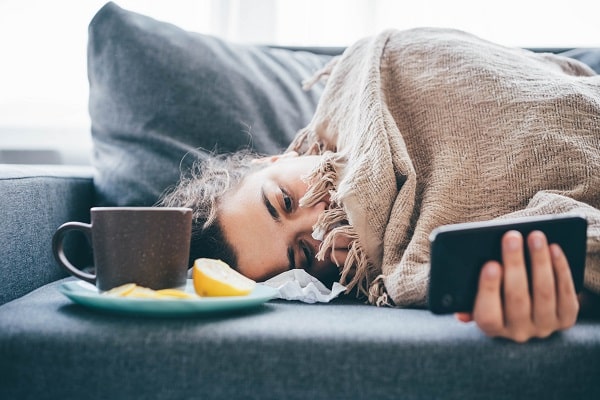
Before delving into cleaning, it’s crucial to understand how germs spread in a living space. Microorganisms like bacteria and viruses can survive on surfaces for varying amounts of time, from a few hours to several days. Commonly touched objects and surfaces can act as a transmission route, spreading the illness to others in the household.
Knowing the life span of these germs on various surfaces can guide your cleaning process. For instance, some viruses can live on plastic and stainless steel surfaces for two to three days, making regular sanitization of these areas critical. Keep in mind, it’s not just about cleaning, but cleaning smart – targeting those areas that can serve as a hotspot for germ proliferation.
Personal Items
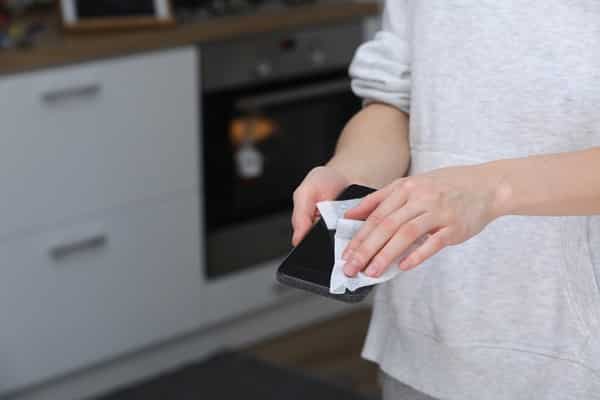
After an illness, personal items used by the sick individual should be thoroughly cleaned. These may include cell phones, remote controls, glasses, and even personal care items. Cleaning these items can be done using disinfectant wipes or a solution of water and bleach (following the manufacturer’s instructions to avoid damage).
While cleaning, pay special attention to buttons and high-touch areas. Remember that effective sanitization involves not just wiping down but allowing the item to air dry to give the disinfectant time to work. It might seem tedious, but this attention to detail can significantly reduce the risk of germs spreading.
Bedroom Area
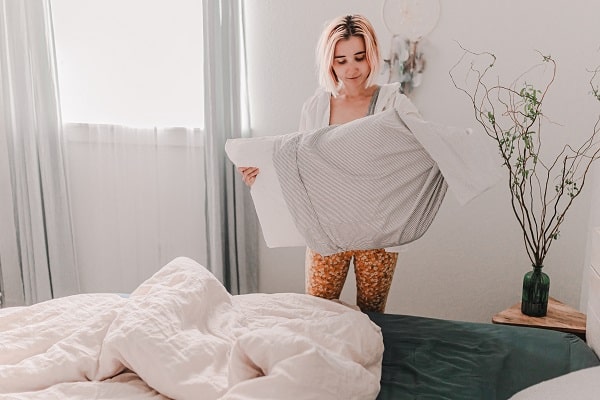
The sick person’s bedding, mattress, and pillows can harbor germs and must be cleaned thoroughly. Bedding and pillowcases should be washed in hot water if possible and dried on a high heat setting. Pillows can usually be cleaned in the washing machine, but always check the care label first.
Cleaning the bedroom area extends to furniture and fixtures too. Wipe down bedside tables, light switches, and door knobs with a disinfectant. Remember to let the surface stay wet for a few minutes to allow the disinfectant to do its job effectively.
Bathroom Cleaning
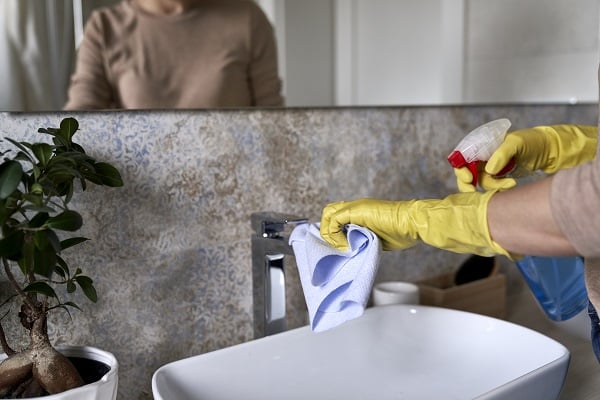
Bathrooms can be a breeding ground for germs, so it’s crucial to clean them effectively. Focus on high-touch areas such as faucet handles, toilet flush handles, and door knobs. These should be cleaned with a disinfectant spray or wipe, with surfaces left to air dry.
Other bathroom items like toothbrush holders, soap dispensers, and even the shower curtain can harbor germs and should be cleaned or replaced. A thorough bathroom cleaning not only eliminates germs but also helps prevent the growth of mold and mildew.
Kitchen Area
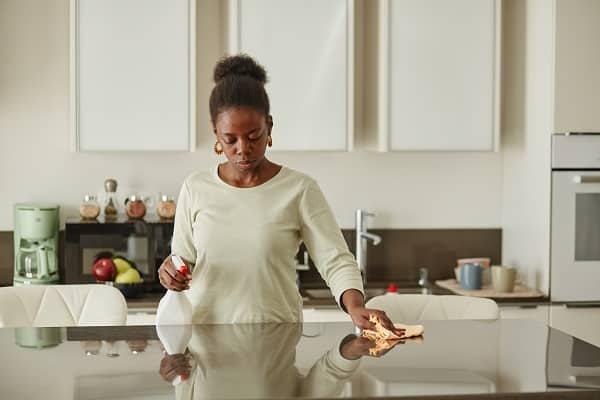
The kitchen is another area that needs attention. Utensils, cutting boards, and other kitchen equipment the sick person uses should be washed in hot soapy water or the dishwasher if safe. For items that you can’t wash in a machine, wash them by hand with hot soapy water, rinse, and then sanitize them with a bleach solution.
Clean and disinfect kitchen surfaces such as countertops, stove knobs, refrigerator handles, and cabinet handles. Again, allow the disinfectant to air dry on the surface. Remember also to clean and sanitize the sink and faucet handles, as they often come into contact with raw food and can be a hotspot for cross-contamination.
Living Room And Common Areas
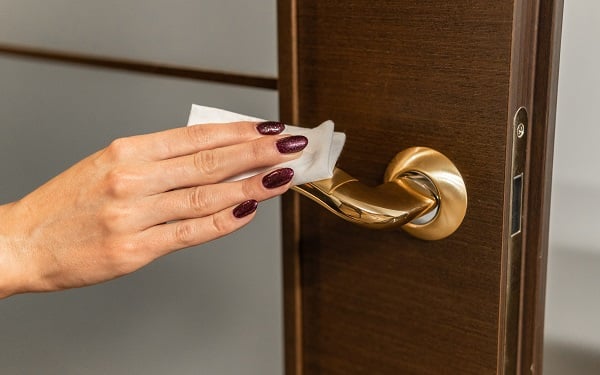
The living room and other common areas should not be overlooked. High-touch surfaces like door knobs, light switches, and handrails should be wiped down with a disinfectant. Upholstery like sofas and chairs that cannot be laundered can be cleaned using a steam cleaner or with disinfectant sprays designed for fabric.
Regularly used electronics such as remote controls or gaming consoles should also be cleaned and disinfected. Remember to use products suitable for electronics to avoid damage. Don’t forget less obvious items like books, magazines, or board games that may have been touched or used while the person was ill.
Clothing And Laundry
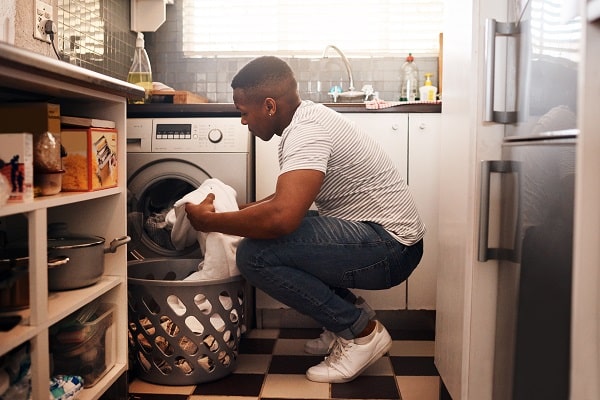
Washing the sick person’s clothing, bed linens, and towels separately can help prevent the spread of germs. Use the warmest appropriate water setting for the items and dry them completely. Don’t forget to clean and disinfect laundry hampers or baskets that may have come into contact with the sick person’s laundry.
It’s also important to protect yourself while doing laundry. Wear disposable gloves if handling clothes from a sick person, and wash your hands thoroughly afterward. You should also avoid shaking the dirty laundry, as this can disperse germs through the air.
Air Purification
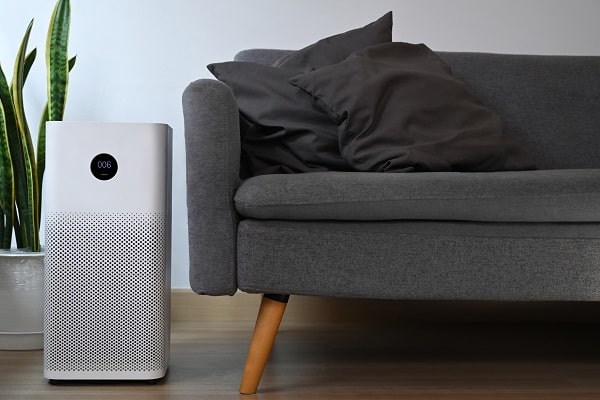
Air purification plays a crucial role in stopping the spread of airborne germs. Good ventilation can help disperse these particles, reducing the chances of others inhaling them. If possible, open windows or doors to increase natural ventilation.
Air purifiers can also be beneficial, especially those equipped with a HEPA filter that can trap tiny particles, including some microorganisms. Remember also to clean and replace HVAC filters as recommended by the manufacturer, as a dirty filter can circulate dust and microbes throughout your home.
Electronic Devices
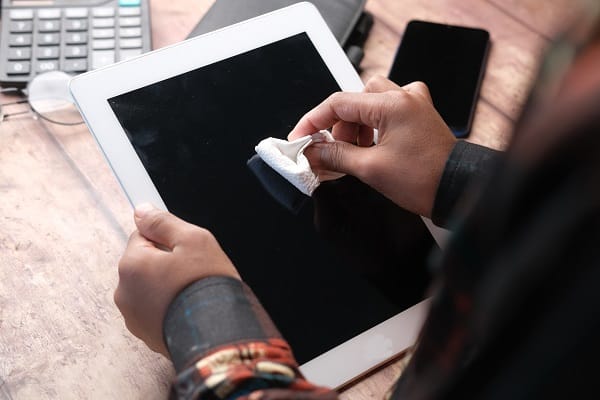
In this digital age, electronic devices such as laptops, tablets, and smartphones are commonly used. Germs can easily linger on these devices, making them a potential source of infection. Use alcohol-based wipes or sprays containing at least 70% alcohol to clean the surfaces of these devices.
Make sure to follow the manufacturer’s instructions for cleaning to avoid damage. Pay attention to high-touch areas such as keyboards and touch screens. Ensure the device is powered off and unplugged before cleaning, and give it adequate time to air dry before use.
Toys And Other Children’s Items
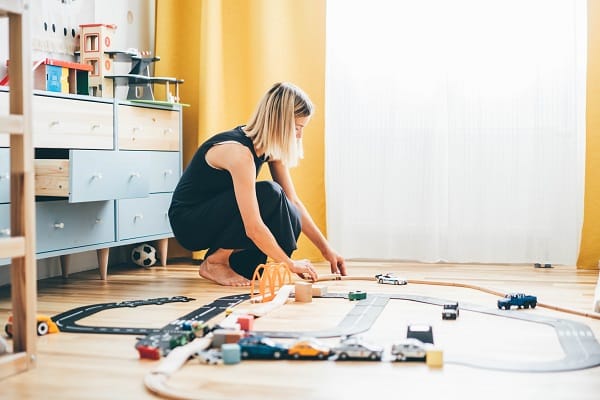
Toys and other items often handled by children should also be cleaned and disinfected. For washable toys, clean them in the washing machine if possible, or wash by hand with soapy water and then sanitize them with a bleach solution. For non-washable toys, clean them with a cloth dampened with soapy water and then disinfect them with an appropriate product.
Remember that while cleaning is necessary, maintaining the safety and integrity of toys is also essential. Always follow the manufacturer’s instructions and let the toys dry entirely before letting children handle them.
When To Bring In Professionals
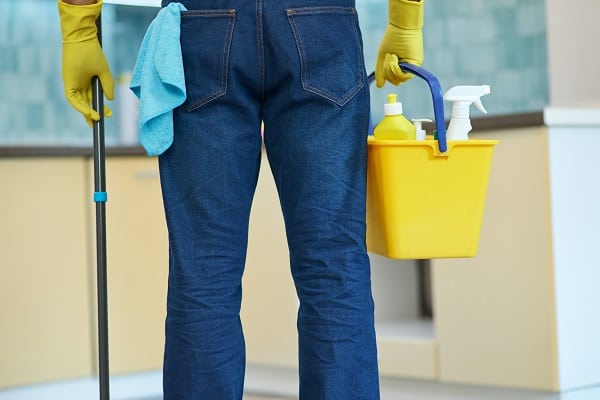
If the illness was severe or contagious, or if you feel overwhelmed by the cleaning process, hiring a professional cleaning service may be appropriate. They can provide a thorough cleaning and disinfection of your home using specialized equipment and techniques.
Professional cleaners can be particularly useful for large or hard-to-clean areas like carpets and upholstery. Always check the credentials and reviews of the cleaning service, and ensure they follow recommended cleaning and disinfection guidelines.
Be Aware Of What You Should Clean After Someone Is Sick!
A thorough cleaning after someone has been sick is an essential step toward restoring health and normalcy in your home. By being mindful of both common and less-obvious areas that can harbor germs, you can effectively reduce the risk of further illness. While it can be a substantial effort, the peace of mind that comes from knowing you’ve created a safe and clean environment is well worth it. Remember, it’s not just about cleanliness but about health, safety, and the well-being of all those in your home!


